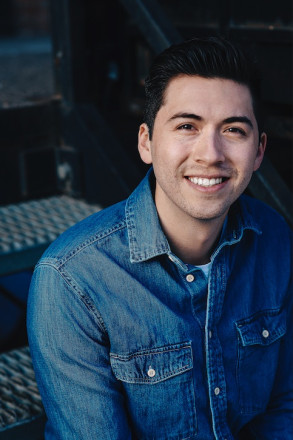A new professional development partnership between Netflix and imagineNATIVE is set to develop the skills of the next great Indigenous screenwriters, directors, and producers.
The imagineNATIVE Institute Screenwriting Features Lab is one of six programs that provides financial support through an intensive program that will take applicants for the next three and a half years.
Winnipeg writer and director Darcy Waite recently participated in the screenwriter program, and two weeks after finishing it he completed the first draft for his first feature film script, Lucky Strikes. Shortly afterwards Telefilm chose Waite for their Talent to Watch program.
Lucky Strikes is a comedy about a young Indigenous man who wants to buy his local bowling alley that he played in growing up with his father. Waite spoke to me about the program, his first script, and where he wants to be in the next ten years.

How would you describe the process of writing and now preparing to film your first feature film?
Waite: It’s been a fun process. It’s my first feature to make it this far down the line, and I’ve learned a ton about writing features during this whole process. I usually focus on series and web series. The biggest challenge is how long a feature is and to try to keep the audience entertained for 90 minutes instead of 10 or 30 minutes. For me, I’m asking the audience a lot of their time, so I want to make sure they’re enjoying themselves.
I’m currently in the fourth or fifth version of the script and each pass, and I’m feeling happier and happier with how the story is starting to shape. During the first draft in the program, I was ready to abandon ship and toss the script out but that’s what happens with every first draft you always think your career might be over. Now that I’ve got the story and characters to a good place, I get to focus on the comedy and trying to punch up the jokes, which is my favourite part.
Preparing to shoot has been like a kid waiting for Christmas at the beginning of December. You know it’s coming, but you have to be patient as all the pieces start to come together. I love the process of filming, it’s organized chaos, and you get to be super creative. When you’re on a comedy set, it’s hard to believe that this is a job. Last year I was shooting a short, and we had a chicken nuggets joke, and the prop master asked me what nugget I wanted and we had to take a look at this massive pile of nuggets she bought to find the right one. We were killing ourselves laughing because of how ridiculous the situation was. Now in a couple of months we get to do that for a month on a feature about bowling.
What has the imagineNATIVE Institute Screenwriting Features Lab meant for you as a filmmaker?
imagineNATIVE has been huge for my career over the past five years, without the features lab Lucky Strikes probably wouldn’t have happened. The lab has given me a chance to direct and write my first feature and make the jump to the next level in my career. It’s advanced my career by 3 to 5 years, but I won’t know the extent till I’m an old man looking back on my career.
Even after the program, imagineNATIVE has been so supportive by continuing to push our films and create more opportunities to get our films into the public eye. Programs like this are helping to create the next generation of filmmakers.
What inspired you to become a filmmaker?
When I was 19 I was trying to figure out what to do with my life. I was pretty useless in the regular employment world and I was too short and old to be an athlete. I’m lucky I fell into this career, I always thought it would be fun, but I never knew anybody who made films for a living. In high school my best friend wanted to be a director, we tried to make films in high school, but they never got off the ground. After high school I wanted to get into medicine, I was in nursing at the University of Alberta when I took an acting class for fun.
That was kind of the end of my medical career and I dropped out and went to film school to be an actor. I’ve always loved comedy, and I knew one day I would jump from working on a dramatic project to straight comedy. It took me a while because like any genre you have to study it in two ways. Number one is how do you make a joke–structure, pace, etc.–and two is how do you personally make someone laugh. There are tons of comedians and each one has a different way of making people laugh, and that’s what took me a couple of years to learn, and I’m still learning it and evolving.
In 10 years, where do you want to be as a filmmaker?
In ten years my goal is to be writing and directing my own big series like how Danny McBride and Rob McElhenney are running their comedy shows with their teams. I also want to help mentor the next generation of comedy filmmakers. I’ve had great mentors coming up in my career, and I want to pay it forward.

Join our list
Subscribe to our mailing list and get weekly updates on our latest contests, interviews, and reviews.
